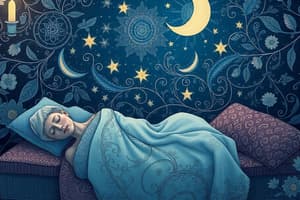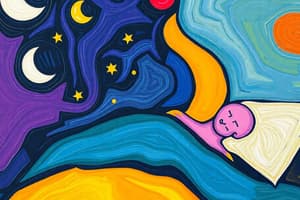Podcast
Questions and Answers
What is the primary function of Stage 3 of NREM sleep?
What is the primary function of Stage 3 of NREM sleep?
- Memory Consolidation
- Clearing Waste
- Deep sleep and difficult to wake up (correct)
- Hormone Regulation
How many sleep cycles do most people experience per night?
How many sleep cycles do most people experience per night?
- 8-10
- 2-3
- 4-6 (correct)
- 6-8
What is the name of the sleep disorder characterized by excessive daytime sleepiness and sudden attacks of sleep?
What is the name of the sleep disorder characterized by excessive daytime sleepiness and sudden attacks of sleep?
- Restless Leg Syndrome
- Sleep Apnea
- Narcolepsy (correct)
- Insomnia
What is the recommended amount of sleep per night for teenagers?
What is the recommended amount of sleep per night for teenagers?
What is the primary characteristic of REM sleep?
What is the primary characteristic of REM sleep?
What is the purpose of establishing a bedtime routine?
What is the purpose of establishing a bedtime routine?
Flashcards are hidden until you start studying
Study Notes
Sleep Stages
- Non-Rapid Eye Movement (NREM) Sleep:
- Stage 1: Transition from wakefulness to sleep, characterized by slow eye movements and a relaxed brain
- Stage 2: Body temperature cools, heart rate slows, and brain waves slow down
- Stage 3: Deep sleep, slow delta brain waves, and difficult to wake up
- Rapid Eye Movement (REM) Sleep:
- Characterized by rapid eye movements, increased brain activity, and vivid dreams
- Brain waves similar to those during wakefulness
Sleep Cycles
- A full sleep cycle lasts around 90-120 minutes
- Each cycle consists of NREM stages 1-3, followed by REM sleep
- Most people experience 4-6 cycles per night
Sleep Functions
- Memory Consolidation: Processing and strengthening memories during sleep
- Clearing Waste: Removal of toxins and waste products from the brain during sleep
- Hormone Regulation: Release of hormones that help with growth, development, and appetite regulation
- Immune System Regulation: Regulation of the immune system and inflammation response
Sleep Disorders
- Insomnia: Difficulty falling or staying asleep
- Sleep Apnea: Pauses in breathing during sleep
- Narcolepsy: Excessive daytime sleepiness and sudden attacks of sleep
- Restless Leg Syndrome: Uncontrollable leg movements during sleep
Sleep Recommendations
- Adults: 7-9 hours of sleep per night
- Teenagers: 8-10 hours of sleep per night
- Children: 9-11 hours of sleep per night
- Establish a Bedtime Routine: Consistent sleep schedule and relaxing bedtime habits
Sleep Stages
- NREM Sleep:
- Comprises stages 1-3, characterized by decreasing brain activity and increasing difficulty to wake up
- Stage 1: Transition from wakefulness, slow eye movements, and relaxed brain
- Stage 2: Cooling body temperature, slowed heart rate, and slowed brain waves
- Stage 3: Deep sleep, slow delta brain waves, and difficulty to wake up
- REM Sleep:
- Characterized by rapid eye movements, increased brain activity, and vivid dreams
- Brain waves similar to those during wakefulness
Sleep Cycles
- A full sleep cycle lasts around 90-120 minutes
- Each cycle consists of NREM stages 1-3, followed by REM sleep
- Most people experience 4-6 cycles per night
Sleep Functions
- Memory Consolidation: Processing and strengthening memories during sleep
- Clearing Waste: Removal of toxins and waste products from the brain during sleep
- Hormone Regulation: Release of hormones that help with growth, development, and appetite regulation
- Immune System Regulation: Regulation of the immune system and inflammation response
Sleep Disorders
- Insomnia: Difficulty falling or staying asleep
- Sleep Apnea: Pauses in breathing during sleep
- Narcolepsy: Excessive daytime sleepiness and sudden attacks of sleep
- Restless Leg Syndrome: Uncontrollable leg movements during sleep
Sleep Recommendations
- Adults: Need 7-9 hours of sleep per night
- Teenagers: Need 8-10 hours of sleep per night
- Children: Need 9-11 hours of sleep per night
- Establish a Bedtime Routine: Consistent sleep schedule and relaxing bedtime habits for better sleep quality
Studying That Suits You
Use AI to generate personalized quizzes and flashcards to suit your learning preferences.




